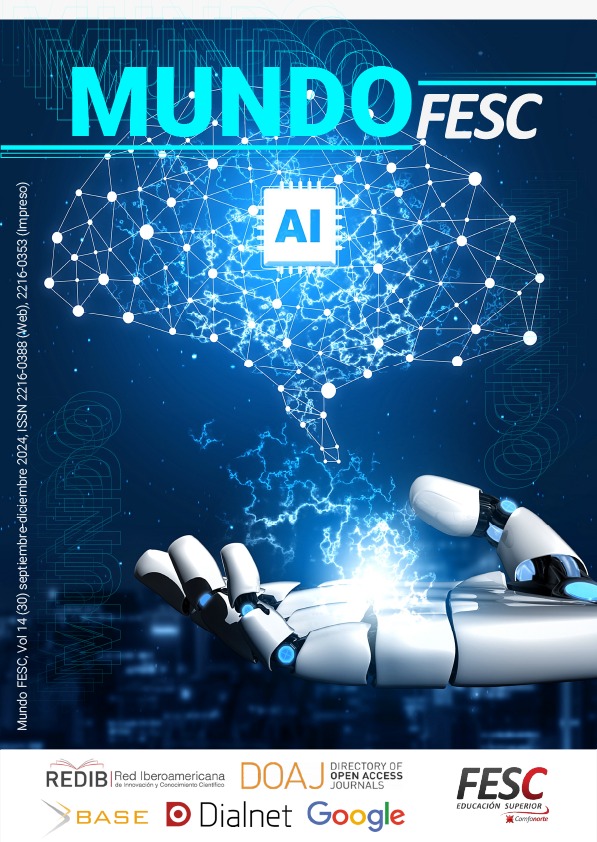Technological and Functional Characterization of Expert Systems
DOI:
https://doi.org/10.61799/2216-0388.1612Keywords:
Machine Learning, Architecture, Artificial Intelligence, Expert Systems.Abstract
Expert systems have emerged as an advanced
technology in the field of Artificial Intelligence,
designed to emulate human decision-making and
reasoning in specific areas of knowledge and industry.
This article provides a detailed characterization of
expert systems from a technological and functional
perspective, presenting details on the technological
architecture, applications, functionalities, and
associated tools, with a focus on the fundamental
role of Artificial Intelligence as the main structure and
support of these systems.
The architecture of expert systems is broken down into
several key elements, including the knowledge base,
inference engine, and user interface, each playing a
significant role in the system's ability to replicate or
simulate human actions. Additionally, the applications
of expert systems are used across a wide range of
industries, from medicine for disease diagnosis to
engineering, where they support manufacturing
processes.
This article is based on recent studies, ensuring
the relevance and importance of the information
presented. Research and advances in the field of expert
systems continue to evolve and transform, driven by
the continuous development of artificial intelligence
and its applications. This article not only provides a
comprehensive overview of expert systems but also
highlights their importance and future challenges in
an increasingly changing digital world.
Downloads
References
[1] A. H. S. Newell, Solución de problemas humanos., 1972.
[2] A. Chhibber, «Advancements in Artificial Intelligence and Machine Learning,» Journal of Artificial Intelligence Research, vol. 58, pp. 201-215, 2021.
[3] S. &. N. P. Russell, Artificial Intelligence: A Modern Approach, Pearson., 2021.
[4] Y. e. a. Sun, «A Review of Natural Language Processing Techniques for Opinion Mining Systems.,» Information Processing & Management, vol. 57, nº 1, pp. 102-117, 2017.
[5] M. &. K. A. Haenlein, «A Brief History of Artificial Intelligence: On the Past, Present, and Future of Artificial Intelligence.,» California Management Review, vol. 61, nº 4, pp. 5-14, 2019.
[6] J. e. a. Sun, «A Review of Machine Learning for Secure Internet of Things: Applications, Challenges, and Future Directions.,» IEEE Communications Surveys & Tutorials, vol. 23, nº 2, pp. 657-695, 2021.
[7] F. A. &. L. E. A. Batarseh, «Data Science for Healthcare: Methodologies and Applications,» Journal of Healthcare Engineering, 2021.
[8] Y. B. Y. &. H. G. LeCun, «Deep Learning.,» Nature, pp. 436-444, 2022. [9] M. Pannu, «Artificial Intelligence in Healthcare: A Review of Technologies and Applications.,» Healthcare Informatics Research, vol. 26, nº 2, pp. 106-120, 2020.
[10] J. &. A. R. Chen, «AI for Medicine: From Data to Knowledge to Action,» Nature Medicine, vol. 26, nº 1, pp. 54-63, 2020.
[11] Q. e. a. Zhang, «A Survey on Knowledge Graphs: Representation, Acquisition, and Applications,» IEEE Transactions on Knowledge and Data Engineering, vol. 34, nº 6, pp. 1237-1255, 2022. DOI: https://doi.org/10.1109/TKDE.2020.2981333
[12] M. &. K. A. Haenlein, «A Brief History of Artificial Intelligence: On the Past, Present, and Future of Artificial Intelligence.,» California Management Review, vol. 61, nº 4, pp. 5-14, 2019. DOI: https://doi.org/10.1177/0008125619864925
[13] P. S. D. &. G. L. Martínez, «Diagnóstico médico asistido por sistemas expertos.,» Salud y Tecnología,, vol. 7, nº 1, pp. 56-68., 2021.
[14] P. &. P. A. González, «Optimización de procesos industriales mediante sistemas expertos.,» Ingeniería y Gestión Industrial, vol. 12, nº 1, pp. 78-89., 2018.
[15] A. &. M. C. Rodríguez, «Personalización del aprendizaje mediante sistemas expertos en educación superior.,» Educación y Tecnología, vol. 14, nº 2, pp. 113-127, 2019.
[16] J. &. R. S. López, «istemas expertos en la gestión de riesgos financieros.,» Economía y Finanzas, vol. 8, nº 4, pp. 22-35, 2020.
[17] R. H. Sampieri, Metodología de la investigación: las rutas cuantitativa, cualitativa y mixta., México: McGraw Hill, 2018.
Downloads
Published
Issue
Section
License
Copyright (c) 2024 Mundo FESC Journal

This work is licensed under a Creative Commons Attribution-NonCommercial 4.0 International License.






